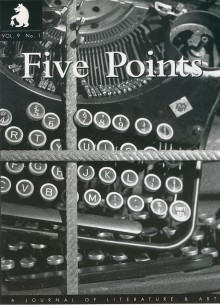Five Points, Vol. 9 No. 1
Spring 2005From Ann Hood “We read to understand the unknown; we should write for the same reasons.”
Sample Content
Christopher Coake
Solos
I.
In the late afternoon of my husband’s fourth day of climbing, his base camp calls me via satellite phone. The news is not so good. After climbing straight through the night, Jozef is now two-thirds of the way up the west face of Shipton’s Peak. He has come farther on the face than anyone ever has. But now his radio is malfunctioning.
Jozef’s friend Hugo says to me, We were talking, and then it just cut off. He says: Of course we worried. But there were no avalanches on the face, and then we spotted him through the binoculars. When the sun set he flashed down with his headlamp that he was all right.
I tell myself, over and over, until my heart doesn’t pound so much: Jozef is still alive.
What now? I ask.
Hugo tells me Jozef’s options, and I write them down. I always answer these calls in my studio, away from Stane, our son, who is eight. This is a superstition of mine; in case the news is bad, I want to compose myself before I have to face our boy. And when Hugo and I hang up, I
sit for a while, thinking of what I will say. Then I take the manila folder full of pictures and walk into the living room. Stane is sitting on the sofa with Jozef’s brother Karel, playing on Karel’s laptop computer. As soon at Stane sees me he wriggles out from under Karel’s arm.
Was that Hugo? he asks. Can I talk to him? You hung up?
I give Karel a look, and he puts his hand on Stane’s head.
Hush for now, Karel says.
I sit down on the sofa, a little ways from Karel. I pat the space between us and Stane sits. Karel puts his arm around Stane; his arms are so long that his fingertips nearly brush my shoulder.
Papa’s all right, I say. But his radio is broken.
Did he get hurt? Stane’s face is more curious than frightened.
No. It just broke. Once it got dark, he used his headlamp to signal he’s all right. But it’s not very good news.

